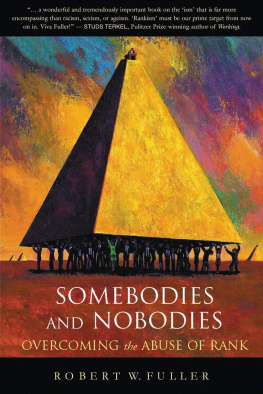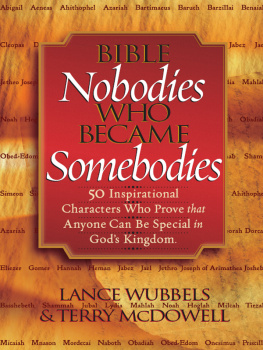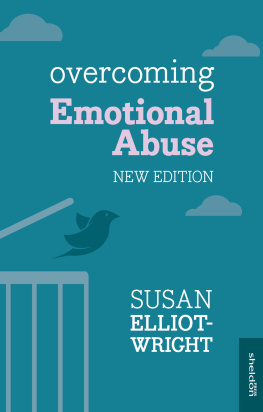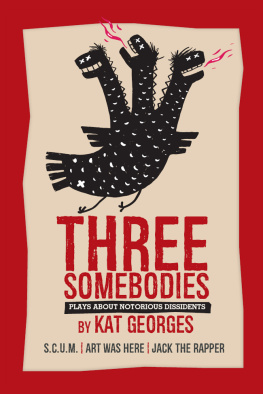Robert W. Fuller - Somebodies and Nobodies: Overcoming the Abuse of Rank
Here you can read online Robert W. Fuller - Somebodies and Nobodies: Overcoming the Abuse of Rank full text of the book (entire story) in english for free. Download pdf and epub, get meaning, cover and reviews about this ebook. year: 2003, publisher: New Society Publishers, genre: Politics. Description of the work, (preface) as well as reviews are available. Best literature library LitArk.com created for fans of good reading and offers a wide selection of genres:
Romance novel
Science fiction
Adventure
Detective
Science
History
Home and family
Prose
Art
Politics
Computer
Non-fiction
Religion
Business
Children
Humor
Choose a favorite category and find really read worthwhile books. Enjoy immersion in the world of imagination, feel the emotions of the characters or learn something new for yourself, make an fascinating discovery.
- Book:Somebodies and Nobodies: Overcoming the Abuse of Rank
- Author:
- Publisher:New Society Publishers
- Genre:
- Year:2003
- Rating:3 / 5
- Favourites:Add to favourites
- Your mark:
- 60
- 1
- 2
- 3
- 4
- 5
Somebodies and Nobodies: Overcoming the Abuse of Rank: summary, description and annotation
We offer to read an annotation, description, summary or preface (depends on what the author of the book "Somebodies and Nobodies: Overcoming the Abuse of Rank" wrote himself). If you haven't found the necessary information about the book — write in the comments, we will try to find it.
Somebodies and Nobodies: Overcoming the Abuse of Rank — read online for free the complete book (whole text) full work
Below is the text of the book, divided by pages. System saving the place of the last page read, allows you to conveniently read the book "Somebodies and Nobodies: Overcoming the Abuse of Rank" online for free, without having to search again every time where you left off. Put a bookmark, and you can go to the page where you finished reading at any time.
Font size:
Interval:
Bookmark:
Advanced Praise for
I've been disturbed, especially during the past several years, by my restaurant encounters. The servers invariably wear an ID: Barbara or James. I, as patron, am always addressed with the prefix `Mr.' I've always made a point to ask, `What's your last name?' I'm not out to make trouble, just curious. The server then often mumbles, as though embarrassed, his or her surname.
Consider this a metaphor for the theme of Robert Fuller's wonderful and tremendously important book on the `ism' that is far more encompassing than racism, sexism or ageism. `Rankism' must be our prime target from now on in. Viva Fuller!
- Studs Terkel, Pulitzer Prize-winning author of Working and The Good War
Somebodies and Nobodies is a shrewd and compelling look at the crucial but usually unperceived role of rank in all our lives. How easily we put down those we see as subordinate in title or wealth or origin; how silently we cringe at another's assumption of superiority. I saw myself in some of the examples, and I shuddered.
But the book is not just a personal analysis. The abuse of rank - the denial of equal dignity to others - corrupts relations between nations, and between the governors and the governed in a democracy. Robert Fuller is a realist, not an advocate of political correctness. He makes us understand that equal dignity, whatever one's place in society or the world, is a key to peace and social order.
- Anthony Lewis, Pulitzer Prize-winning former columnist for The New York Times
Advance Praise for
It's a book that parents should give their children, and a must-read for anyone who cares about the future of this country. Robert Fuller is sure to make the history books with Somebodies and Nobodies.
- Donald Corbett, former policeman
At the core of every humiliation and indignity is a mental error, not just a habit - a lacuna so vast and unremitting that it passes unnoticed. You don't fix such a thing. It is not something to be patched. Nothing can be done until it is noticed, until it is named. Naming creates distinctions, distinctions create the capacity to change. Naming `rankism' transforms everything.
- Paul Hawken, author of Natural Capitalism
I've been treated like a nobody for too long. I'm going to give a copy of this book to the principal of my school on the day I leave.
- John F., 8th grade science teacher
Robert Fuller's insightful book has penetrated to the core of human dignity. He helps us understand why nearly all of us, even those with visible status and power, often feel belittled and diminished as human beings by the power of still higher status. But Somebodies and Nobodies is more than a diagnosis; it is a new way forward toward a society that takes seriously the deep conviction that we are truly all created equal.
- Peter Schwartz, Chairman, Global Business Network; author of
The Art of the Long View
Robert Fuller refreshingly revives the case for serious mutual respect among all human beings, and indeed foresees the struggle for individual dignity, and an attack on its nemesis, `rankism,' as the next great public movement in the United States. An insightful, thought-provoking, and novel treatment of an age-old subject.
- Richard N. Cooper, Maurits C. Boas Professor of International Economics,
Harvard University; Undersecretary of State for Economic Affairs
in the Carter administration
It's a book that parents should give their children, and a must-read for anyone who cares about the future of this country. Robert Fuller is sure to make the history books with Somebodies and Nobodies.
Somebodies and Nobodies deserves a place among American wisdom classics alongside Eric Hoffer's The True Believer. Robert Fuller approaches the fundamental problems of rank and human status-seeking from a new perspective, with new insights, and with wonderful originality. This book will promote liberating debate about social norms, organizational structures, and governance.
- Michael Murphy, co-founder of Esalen, author of
Golf in the Kingdom and The Future of the Body
In many ballet companies, young dancers are constantly being stripped of their humanity, innate sense of artistry, and individuality by the internal abuse of power. Just imagine how brilliantly dance would move forward without the weight of this oppression! Thanks to Robert Fuller for identifying the `rankism' that has been holding back our creativity for centuries.
- Brook Broughton, corps de ballet, San Francisco Ballet
Simply brilliant. A rare treat full of insight, inspiration and plain, sane Common Sense. A modern-day Thomas Paine, Robert Fuller argues persuasively that democracy will only realize its full potential when `dignitarians' unite to overcome `rankism,' the archetype of all `isms'- imperialism, colonialism, anti-Semitism, racism, sexism. Buy multiple copies because you'll want to share this marvelous book with your friends.
- Jeff Gates, author of The Ownership Solution and Democracy at Risk
Somebodies and Nobodies will precipitate a national conversation about a pervasive but, until now, unnamed social dysfunction - `rankism.' Watch for a `dignitarian' movement against rankism that, like the civil rights and women's movements, will transform American life - in the boardroom, the schoolroom, the bedroom and, a lot sooner than we might think, at the ballot box.
- Jerry Greenfield, co-founder of Ben and Jerry's Ice Cream
Somebodies and Nobodies deserves a place among American wisdom classics alongside Eric Hoffer's The True Believer. Robert Fuller approaches the fundamental problems of rank and human status-seeking from a new perspective, with new insights, and with wonderful originality. This book will promote liberating debate about social norms, organizational structures, and governance.
This book is essential reading for those who wish to restore human dignity in the world. It demands an end to a rather subtle but deepseated discrimination in our society, one based on status and rank. All presidents, politicians and CEOs should read this mind-boggling book. It will blow away their self-aggrandizing cobwebs.
-Satish Kumar, Editor, Resurgence
We know from statistics that U.S. society has become dramatically more unequal over the past generation. But Robert Fuller excavates the real-life stories behind the numbers, showing how `rankism' tramples on human dignity. Somebodies and Nobodies is a lucid and provocative manifesto for a more equal, and therefore more just, social order.
- Robert Pollin, co-author of The Living Wage: Building a Fair Society, Professor of
Economics and Co-Director, Political Economy Research Institute,
University of Massachusetts-Amherst
In Somebodies and Nobodies, Robert Fuller brilliantly describes a pervasive form of discrimination he calls `rankism' - a painful reality commonly experienced but previously unnamed. This book will change the way we think about class, power, and status in America."
- Rev. Dr. Andrea Ayvazian, Dean of Religious Life, Mount Holyoke College
Somebodies and Nobodies makes an important contribution to understanding what really ails us. It eloquently describes the `rankism' inherent in the domination model identified by my research as the opposite of the partnership model for human relations. It speaks to us from both the heart and mind. I highly recommend it.
- Riane Eisler, author of The Chalice and the Blade, Tomorrow's Children, and
The Power of Partnership
This book is essential reading for those who wish to restore human dignity in the world. It demands an end to a rather subtle but deepseated discrimination in our society, one based on status and rank. All presidents, politicians and CEOs should read this mind-boggling book. It will blow away their self-aggrandizing cobwebs.
Next pageFont size:
Interval:
Bookmark:
Similar books «Somebodies and Nobodies: Overcoming the Abuse of Rank»
Look at similar books to Somebodies and Nobodies: Overcoming the Abuse of Rank. We have selected literature similar in name and meaning in the hope of providing readers with more options to find new, interesting, not yet read works.
Discussion, reviews of the book Somebodies and Nobodies: Overcoming the Abuse of Rank and just readers' own opinions. Leave your comments, write what you think about the work, its meaning or the main characters. Specify what exactly you liked and what you didn't like, and why you think so.












